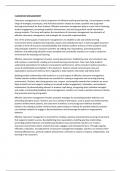CLASSROOM MANAGEMENT
Classroom management is a critical component of effective teaching and learning. It encompasses a wide
range of strategies, techniques, and skills that teachers employ to create a positive and supportive
learning environment for their students. Effective classroom management plays a crucial role in fostering
student engagement, promoting academic achievement, and nurturing positive social interactions
among students. This essay will explore the importance of classroom management, key elements of
effective classroom management, and strategies for successful implementation.
One of the primary goals of classroom management is to establish a safe and orderly learning
environment where students feel respected, valued, and motivated to learn. A well-managed classroom
provides a sense of structure and predictability that enables students to focus on their academic tasks
and participate actively in classroom activities. By setting clear expectations, promoting positive
behavior, and addressing discipline issues promptly and consistently, teachers can create a conducive
environment for teaching and learning.
Effective classroom management involves several key elements. Establishing clear and consistent rules
and routines is essential for creating a structured learning environment. Clear rules help students
understand expectations for behavior and academic performance, while consistent routines provide a
sense of predictability and stability in the classroom. Teachers should communicate rules and
expectations clearly and reinforce them regularly to help students internalize and follow them.
Building positive relationships with students is a crucial aspect of effective classroom management.
Positive teacher-student relationships are essential for creating a supportive and nurturing learning
environment. Teachers who show genuine care, respect, and empathy towards their students are more
likely to build trust and rapport, leading to increased student engagement, motivation, and academic
achievement. By demonstrating interest in students' well-being, recognizing their individual strengths
and needs, and providing feedback and encouragement, teachers can create a positive classroom climate
that promotes learning and growth.
Effective classroom management involves proactive strategies for promoting positive behavior and
preventing discipline issues. Teachers can use a variety of techniques, such as praise and reinforcement,
positive reinforcement systems, and classroom incentives, to encourage and reinforce desirable
behavior. By creating a positive reinforcement system based on rewards for positive behavior, teachers
can motivate students to engage in desired behaviors and discourage disruptive or inappropriate
behavior.
Effective classroom management is essential for creating a positive and productive learning environment
that supports student success. By establishing clear expectations, building positive relationships,
promoting positive behavior, and addressing discipline issues proactively, teachers can create a
classroom environment where students feel safe, engaged, and motivated to learn. Through ongoing
reflection, evaluation, and adjustment of classroom management strategies, teachers can enhance their
teaching effectiveness, promote student achievement, and foster a culture of respect, collaboration, and
learning in the classroom.




